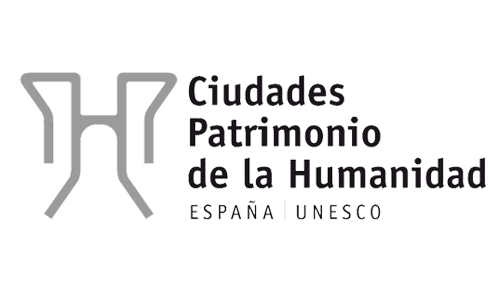-
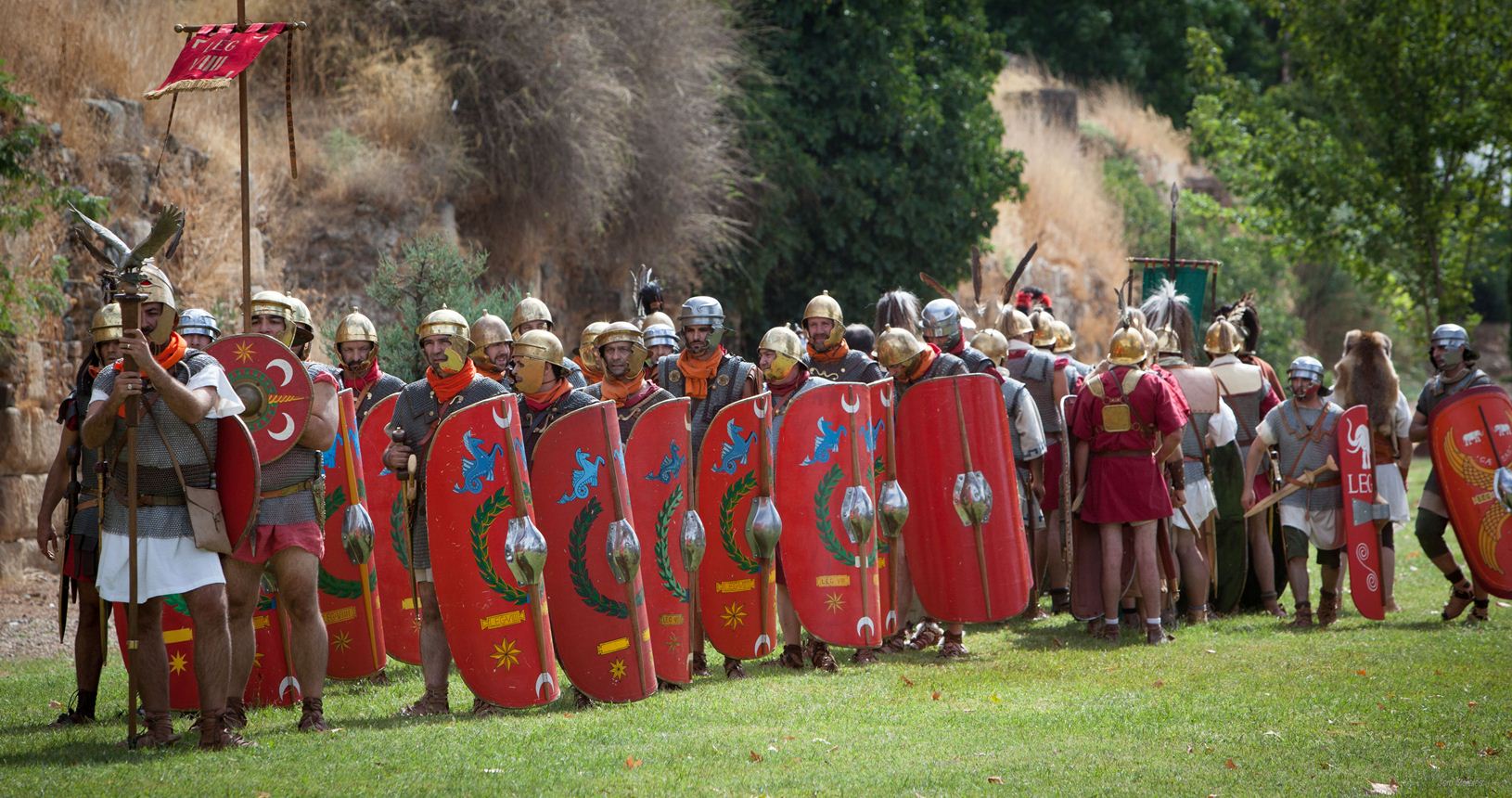 Festivals and Events
Festivals and Events
Mérida has a wide range of festivals and events that happen throughout the year. Its famous International Classical Theatre Festival delights visitors during the nights of July and August. Holy Week has been declared to be of National Touristic Interest, and the Roman Carnival is full colors, irony, criticism, and feeling with the dances and songs of its Carnival groups. During the Emerita Lvdica celebration, you can immerse yourself in the period in order to recreate one of city's most glorious times – the times of ancient Augusta Emerita. These are some examples of the cultural wealth and variety that Mérida offers its visitors and inhabitants.
CLASSICAL THEATRE FESTIVAL
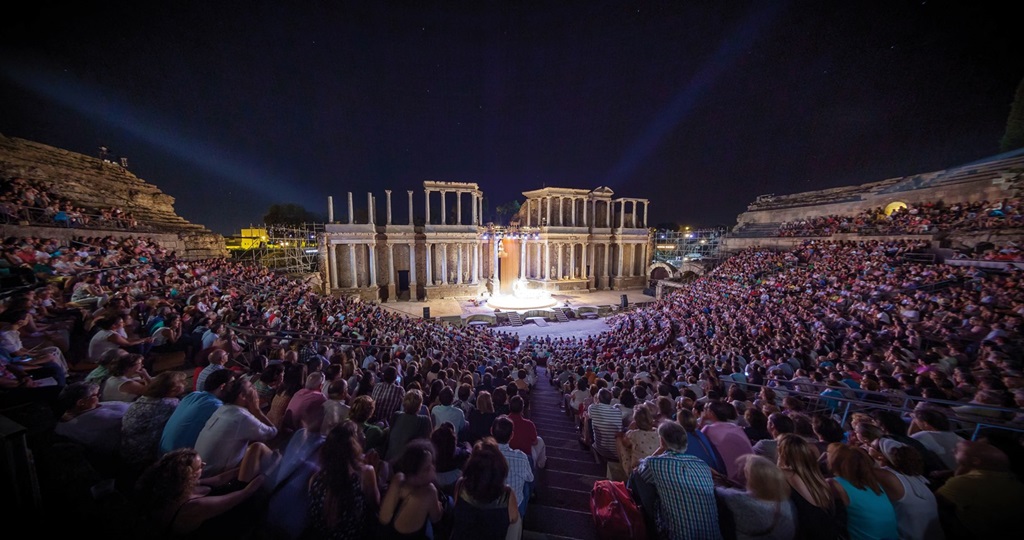 The most important Classical Theatre Festival of the country has a great reputation for masterfully combining culture, shows, and ancient times. The festival is an event that spans the entire summer – from early July until the end of August conferences, seminars, and exhibitions all take place in relationship with the festival and the context around which it unfolds.
The most important Classical Theatre Festival of the country has a great reputation for masterfully combining culture, shows, and ancient times. The festival is an event that spans the entire summer – from early July until the end of August conferences, seminars, and exhibitions all take place in relationship with the festival and the context around which it unfolds.
The festival was born in the year 1933 when Margarita Xirgu played Medea in the version of the work written by Euripides. From then on, the festival has gradually added different forms of artistic expression such as opera, ballet, and classical music, all of which make reference to the Graeco-Roman world upon which the festival is based.
Spectators who attend the shows are immersed in a wonderful atmosphere surrounded by the grandiose stages of the Roman Theatre and Amphitheatre.
Website: www.festivaldemerida.es
HOLY WEEK
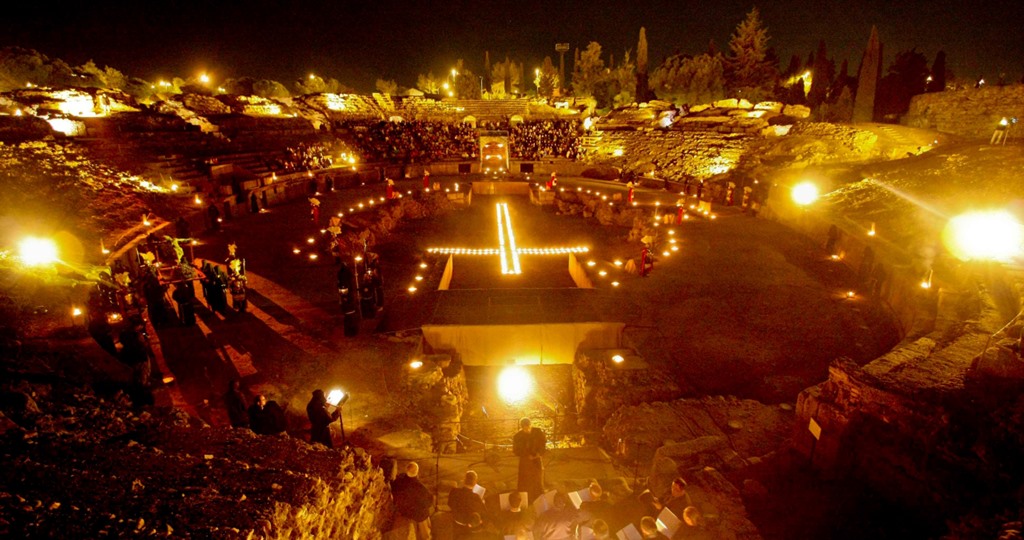
Mérida's Holy Week was declared a Festival of International Touristic Interest by the Ministry of Industry and Tourism in 2018.
It's a celebration whose point of reference is the Solemn Procession and the Way of the Cross, which take place in the Roman Amphitheatre and include the participation of the Santísimo Cristo de la O Confraternity Association in the early morning hours of Holy Thursday.
Noteworthy is the pass of the Brotherhoods and Confraternities around various monuments located in the city's historic center, such as the Arch of Trajan, the Roman Bridge, the Arabic Alcazaba, and the Temple of Diana, which gives the festivities a touch of unique distinction when compared with similar celebrations held elsewhere.
Nine Confraternities participate in processions from Palm Sunday to Easter Sunday. They are all members of the Local Association of Confraternities, which is responsible for organizing Holy Week.
Website: www.semanasantademerida.org
EMERITA LVDICA
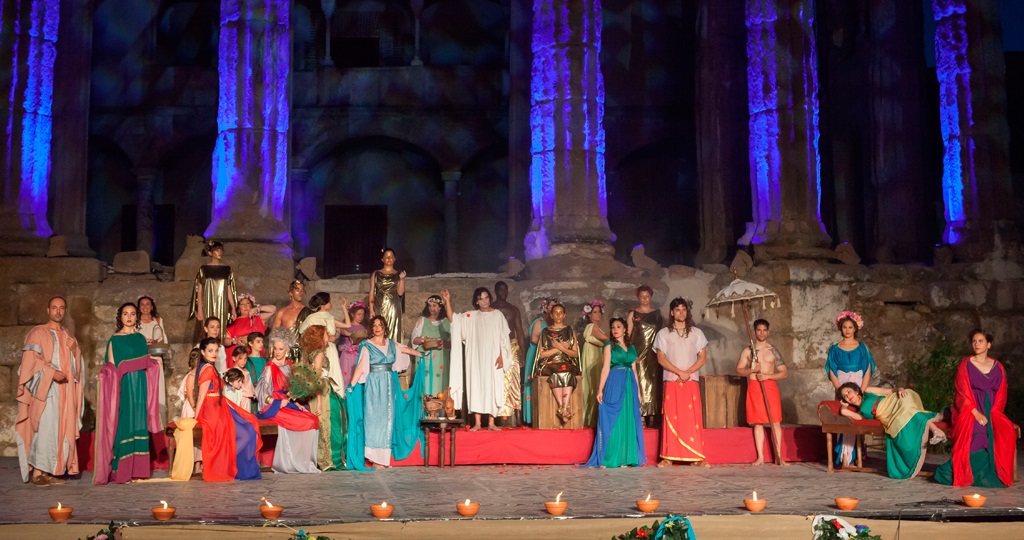
At the beginning of Summer, the city of Mérida offers you the opportunity to be a witness (or, preferably, an actor or extra) of scenes from everyday life in the Roman world, getting to know their way of life by using the original scenery that makes up the best-preserved and most complete collection of archaeological monuments of Hispania: Emerita Augusta.
Emerita Lvdica (lvdi = games) takes this name in order to remind us of the festive atmosphere that accompanied the games of the capital of Lusitania. Gladiator challenges are fought, rites are celebrated in the Temple of Diana, the Forum becomes full of life, recreating scenes from the everyday life of Emerita Augusta, the Legionaries enter via the city's Roman bridge, camping at its gates, where they do training exercises, and there are continuous re-enactments of daily life in a Roman town.
+info: www.turismomerida.org
ROMAN CARNIVAL
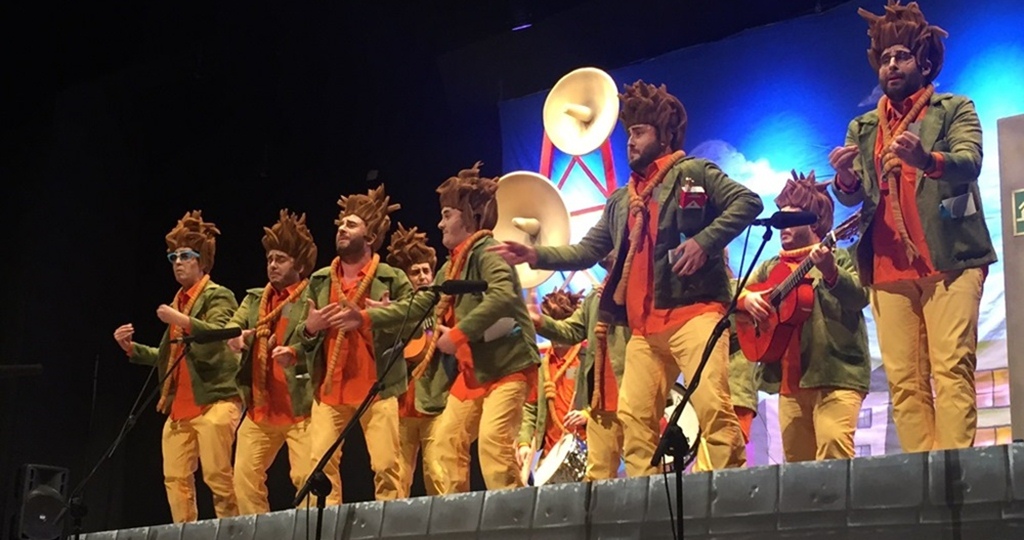
Between February and March, this folk festival that is on the increase is celebrated in our city, mainly featuring comparsas and chirigotas (singing and dancing troupes) that, through their shows and songs, help to delight visitors. Many of these groups of singers and dancers draw the inspiration for their characters and costumes from the Roman world.
Amongst the most important events of the Roman Carnival are the Comparsas and Chirigotas Contest, the Cantacalles, parades for young children, the Carnavalada Carnival Events, the National Drag Queen Contest, and the Magnificent Carnival Parade. The Carnival festivities are wrapped up with the traditional Burial of the Sardine.
+info: www.merida.es
STONE & MUSIC FESTIVAL
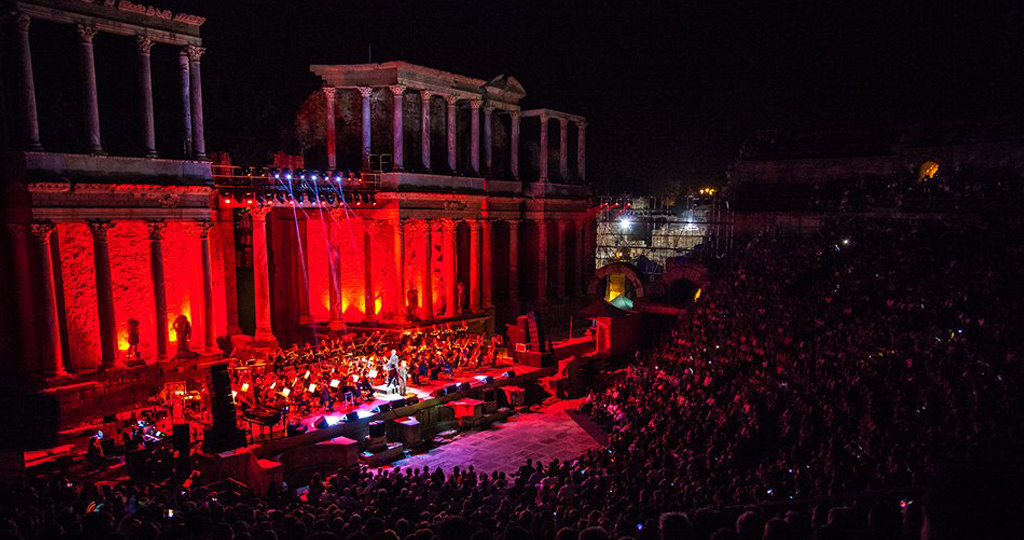
After the first annual event held in 2016, the Roman Theatre of Mérida has become the most sought-after dream of the best national and international musicians. It’s an open space with the biggest stage of Spain and one of the largest in Europe that can accommodate and blend the most varied styles, giving them a completely different dimension. The Stone & Music Festival welcomes musicians of very different genres.
Atop such a special stage, under the immense sky of this southernly land, reflecting the light of the moon, people of different status and backgrounds look forward to enjoying and experiencing the essence of the show. There is no curtain; instead, the stage is framed by stout, classical columns.
Website: stoneandmusicfestival.com
SEPTEMBER FAIR
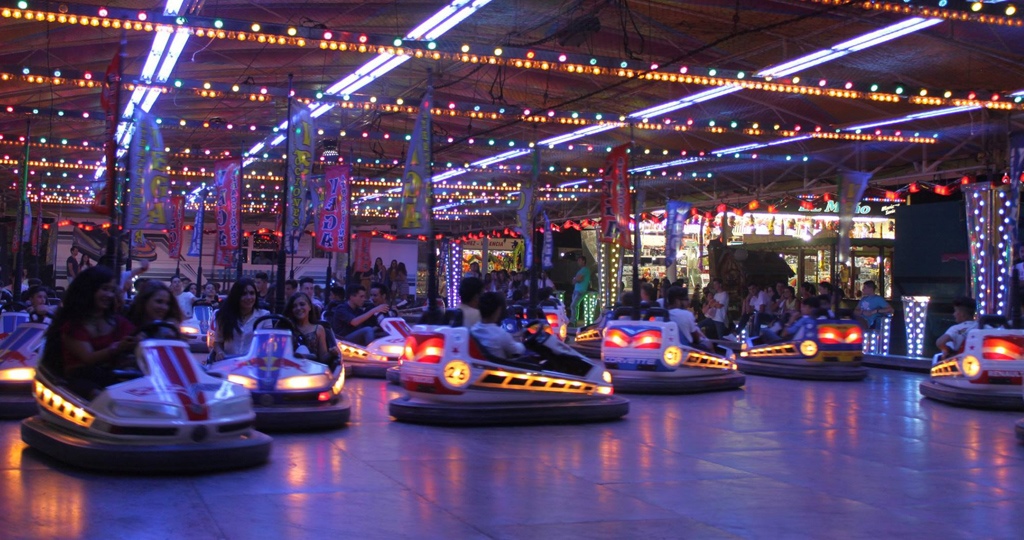
These are days of meetings and entertainment for the inhabitants of Mérida and the surrounding villages. Amongst the wide range of festive events are numerous recreational activities, sports, and major music concerts. The Fair takes place on the Fairgrounds, which are decked out for the occasion.
+info: www.merida.es
SAINT EULALIA: MARTYR AND SAINT PATRON
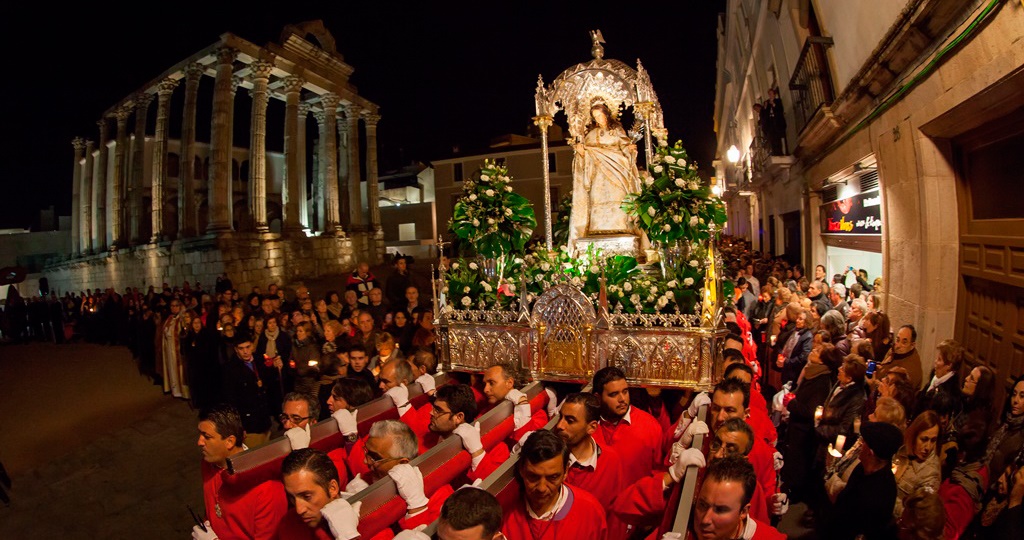
This celebration begins the night before with the arrival to the city –from the neighboring town of Arroyo de San Serván– of hundreds of pilgrims who are followers of the Martyr Child. The next day, the image of the Martyr is taken to the streets, accompanied by citizens and personalities who have come from many parts of the country.
+info: www.merida.es
GRAECO-ROMAN YOUTH THEATRE FESTIVAL
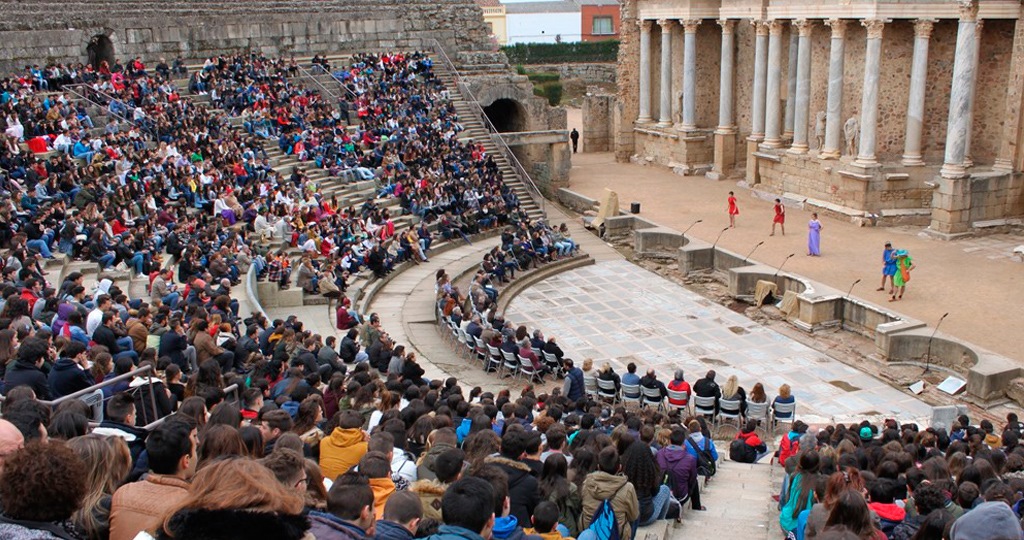
This festival, attended by youth from around Spain, has been held since 1997 in the Roman Theatre during the months of April and May. It has a number of quite educational features as it is designed for young people and theatre groups of secondary school age. Organized by Secondary School Centre IES Santa Eulalia.
UNRELEASED FILM FESTIVAL
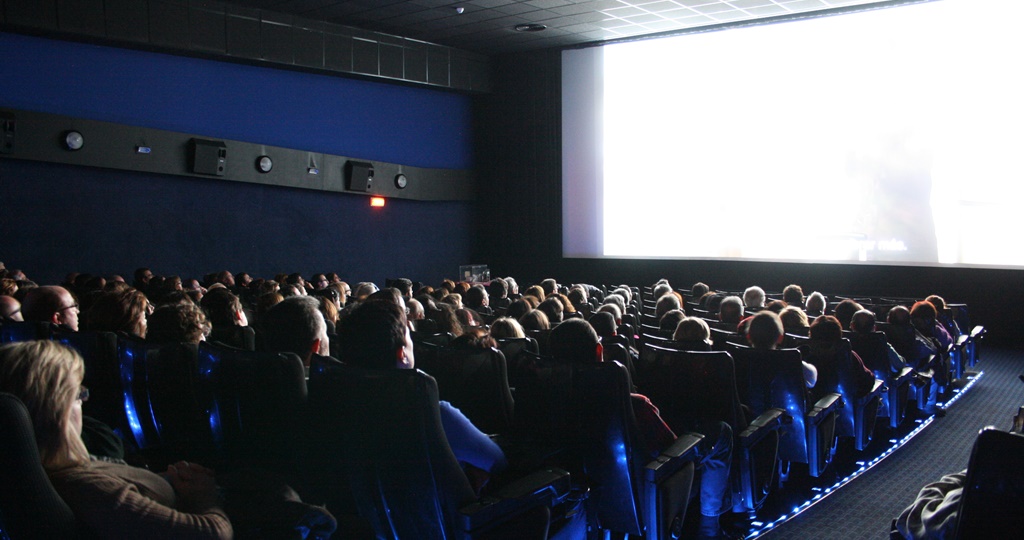
In recent years, this festival, organized by the Cine-Club Forum Association, has gained strength as it showcases films that, due to commercial distribution constraints, have not yet been released in Extremadura but enjoy numerous international awards.
Website: festivalcinemerida.com
CLASSICAL THEATRE FESTIVAL

The most important Classical Theatre Festival of the country has a great reputation for masterfully combining culture, shows, and ancient times. The festival is an event that spans the entire summer – from early July until the end of August conferences, seminars, and exhibitions all take place in relationship with the festival and the context around which it unfolds.
The festival was born in the year 1933 when Margarita Xirgu played Medea in the version of the work written by Euripides. From then on, the festival has gradually added different forms of artistic expression such as opera, ballet, and classical music, all of which make reference to the Graeco-Roman world upon which the festival is based.
Spectators who attend the shows are immersed in a wonderful atmosphere surrounded by the grandiose stages of the Roman Theatre and Amphitheatre.
HOLY WEEK

Mérida's Holy Week was declared a Festival of International Touristic Interest by the Ministry of Industry and Tourism in 2018.
It's a celebration whose point of reference is the Solemn Procession and the Way of the Cross, which take place in the Roman Amphitheatre and include the participation of the Santísimo Cristo de la O Confraternity Association in the early morning hours of Holy Thursday.
Noteworthy is the pass of the Brotherhoods and Confraternities around various monuments located in the city's historic center, such as the Arch of Trajan, the Roman Bridge, the Arabic Alcazaba, and the Temple of Diana, which gives the festivities a touch of unique distinction when compared with similar celebrations held elsewhere.
Nine Confraternities participate in processions from Palm Sunday to Easter Sunday. They are all members of the Local Association of Confraternities, which is responsible for organizing Holy Week.
Website: www.semanasantademerida.org
EMERITA LVDICA

At the beginning of Summer, the city of Mérida offers you the opportunity to be a witness (or, preferably, an actor or extra) of scenes from everyday life in the Roman world, getting to know their way of life by using the original scenery that makes up the best-preserved and most complete collection of archaeological monuments of Hispania: Emerita Augusta.
Emerita Lvdica (lvdi = games) takes this name in order to remind us of the festive atmosphere that accompanied the games of the capital of Lusitania. Gladiator challenges are fought, rites are celebrated in the Temple of Diana, the Forum becomes full of life, recreating scenes from the everyday life of Emerita Augusta, the Legionaries enter via the city's Roman bridge, camping at its gates, where they do training exercises, and there are continuous re-enactments of daily life in a Roman town.
ROMAN CARNIVAL

Between February and March, this folk festival that is on the increase is celebrated in our city, mainly featuring comparsas and chirigotas (singing and dancing troupes) that, through their shows and songs, help to delight visitors. Many of these groups of singers and dancers draw the inspiration for their characters and costumes from the Roman world.
Amongst the most important events of the Roman Carnival are the Comparsas and Chirigotas Contest, the Cantacalles, parades for young children, the Carnavalada Carnival Events, the National Drag Queen Contest, and the Magnificent Carnival Parade. The Carnival festivities are wrapped up with the traditional Burial of the Sardine.
STONE & MUSIC FESTIVAL

After the first annual event held in 2016, the Roman Theatre of Mérida has become the most sought-after dream of the best national and international musicians. It’s an open space with the biggest stage of Spain and one of the largest in Europe that can accommodate and blend the most varied styles, giving them a completely different dimension. The Stone & Music Festival welcomes musicians of very different genres.
Atop such a special stage, under the immense sky of this southernly land, reflecting the light of the moon, people of different status and backgrounds look forward to enjoying and experiencing the essence of the show. There is no curtain; instead, the stage is framed by stout, classical columns.
Website: stoneandmusicfestival.com
SEPTEMBER FAIR

These are days of meetings and entertainment for the inhabitants of Mérida and the surrounding villages. Amongst the wide range of festive events are numerous recreational activities, sports, and major music concerts. The Fair takes place on the Fairgrounds, which are decked out for the occasion.
+info: www.merida.es
SAINT EULALIA: MARTYR AND PATRON

This celebration begins the night before with the arrival to the city –from the neighboring town of Arroyo de San Serván– of hundreds of pilgrims who are followers of the Martyr Child. The next day, the image of the Martyr is taken to the streets, accompanied by citizens and personalities who have come from many parts of the country.
+info: www.merida.es
GRAECO-ROMAN YOUTH THEATRE FESTIVAL

This festival, attended by youth from around Spain, has been held since 1997 in the Roman Theatre during the months of April and May. It has a number of quite educational features as it is designed for young people and theatre groups of secondary school age. Organized by Secondary School Centre IES Santa Eulalia.
Website: iessantaeulalia.educarex.es
UNRELEASED FILM FESTIVAL

In recent years, this festival, organized by the Cine-Club Forum Association, has gained strength as it showcases films that, due to commercial distribution constraints, have not yet been released in Extremadura but enjoy numerous international awards.
Website: festivalcinemerida.com

